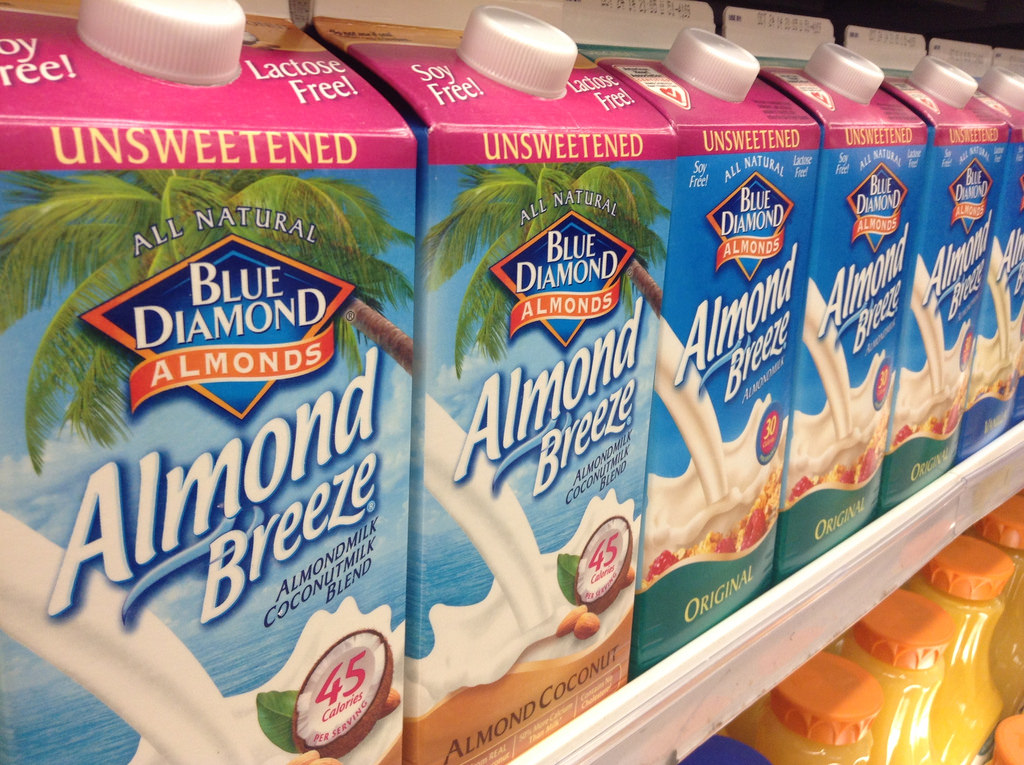
Commercially sold almond milks, as found at your local health store, are full of synthetic chemicals that stress your immune system and contribute to chronic disease. Read on to find out why you should only drink real home-made almond milk.
Synthetic Ingredients:
Here are just some of the harmful ingredients you will find listed on your store-bought “almond milk” carton:
Vitamin A Palmitate – This is a synthetic version of vitamin A that is associated with birth defects and bone fractures while providing zero health benefits. Other side effects of this isolated chemical form of vitamin A include tumor enhancement, joint disorders, osteoporosis, extreme dryness of eyes, mouth and skin, enlargement of liver and spleen, irritability, drowsiness, fatigue, insomnia, abdominal pain, blurred vision, headache, hair loss, muscle pain with weakness, menstrual abnormalities, seizures, nausea, and immune suppression.
Furthermore, vitamin toxicity, known as hyper-vitaminosis, commonly results from consuming too much synthetic “purified” vitamin A and not from naturally occurring vitamin A (from real food sources). A study published in the American Journal of Clinical Nutrition reports that “the acute and chronic effects of vitamin A toxicity are well documented in the literature. Emerging evidence suggests that subtoxicity without clinical signs of toxicity may be a growing concern, because intake from preformed sources of vitamin A often exceeds the recommended dietary allowances (RDA) for adults, especially in developed countries [emphasis is mine]”.1
Vitamin D2 – This is the synthetic form of vitamin D. Numerous recent studies have demonstrated that vitamin D supplements are highly ineffective at preventing disease, and potentially harmful. Even in amounts considered safe, taking vitamin D over an extended period of time has been shown to contribute to a wide range of health issues, including gastrointestinal symptoms, increases in LDL cholesterol, prostate cancer, kidney disease, and calcium stones.2-8
This is especially a concern for children who consume many products that are fortified with this chemical. The immediate effects of toxicity include abdominal cramps, nausea, vomiting, headache, muscle weakness and bone pain. As toxicity continues over time, the result could be a buildup of irreversible deposits of calcium crystals in the soft tissues of the body that damage the heart, lung and kidneys.9
To best way to prevent Vitamin d deficiency is through sunshine, not pills. For more information watch “The truth about vitamin D”.
Calcium Carbonate – This is derived from non-organic, non-living mineral sources such as chalk and eggshells. That’s right, you are consuming chalk- the same stuff you use to write on a blackboard! Even more worrisome, however, is the fact that calcium supplementation is associated with serious health risks such as cardiovascular disease, prostate cancer and kidney stones.10 Recent studies are finding that it may even increase the rate of hip fractures in older women.11 Unfortunately, many foods, such as almond milk, breakfast cereals and orange juice, are fortified with supplemental forms of calcium. This should alert you to the fact that people are commonly consuming large amounts of dangerous supplements without even realizing it. It’s just another part of our SAD Standard American Diet which leads us down the path of our “disease-care system”. My video, The End of Osteoporosis, exposes the truth about calcium supplementation and osteoporosis.
Dl-Alpha Tocopherol Acetate (vitamin E) – Included in some brands of almond milk, this synthetic petroleum derived version of vitamin E has been shown to increase the risk of prostate cancer in healthy men. Dr. Marc Garnick, a clinical professor of medicine at Harvard Medical School, an oncologist at Beth Israel Deaconess Medical Center, and editor in chief of Harvard’s Annual Report on Prostate Diseases, warns all of his patients to completely avoid any dietary supplement containing vitamin E.12 Hopefully, he also teaches them to avoid this ingredient by reading the label on all of the “fortified” processed foods they consume, such as almond milk.
Studies have repeatedly shown that the human body prefers whole, natural Vitamin E because it retains it at healthful levels as opposed to working to quickly excrete it as it does with synthetic versions. After absorption, a protein in the liver recognizes only the naturally occurring forms of Vitamin E, while the unrecognized synthetic forms are excreted. The Toxicology Data Network provides a list of the numerous health problems related to synthetic vitamin E. This list includes skin rashes, GI irritation, blurred vision, breast enlargement in males and females, diarrhea, dizziness, flu-like symptoms, headache, nausea, stomach cramps and weakness. A 2006 report on natural versus synthetic vitamin E, presented at the American Oil Chemists’ Society symposium, concluded as follows: “In conclusion, natural Vitamin E is a major safe antioxidant nutrient that consists of 8 different components. It is chemically different from synthetic Vitamin E. The natural form is at least twice as effective physiologically than the synthetic form. In addition new research is showing specific health benefits of the individual natural forms.” 13
Synthetic chemicals do not equal naturally occurring nutrients:
- Your body does not always recognize synthetic (man-made) ingredients in vitamins and supplements, and reacts differently than when provided with real food.
- When you ingest a synthetically produced vitamin, such as the ones found in “almond milk”, your body reacts as if you have swallowed some foreign toxic chemical. This means that your immune system must combat the enemy invasion. If you keep stressing your immune system in this way it will eventually become too weak to protect you from illness or disease.
- Lastly, since the very beginning of the boom in the supplement industry which included “fortified” and “enriched foods”, the scientific community has known, researched, and clearly shown with numerous studies that synthetic supplements weaken your health. In fact, these chemicals found in your “almond milk,” bread, and cereal boxes are not properly absorbed nor utilized by your body – instead they act as a burden to your health, even causing withdrawal symptoms when you eliminate them from your diet. Nothing replaces whole food, naturally occurring nutrients that your body recognizes, absorbs, and utilizes as nourishment.
- Over 60,000 cases of vitamin toxicity are reported annually to US poison control centres.14 With close to 50% of the North American population taking vitamin supplements daily, and with synthetic vitamins added to many foods, vitamin toxicity remains a growing yet largely unreported health issue.
You can read more warnings from the Organic Consumers Association regarding how isolated synthetic vitamins are not recognized or metabolized by the body in the same way as naturally occurring nutrients.
Home-Made Almond Milk is Your Only Healthy Option:
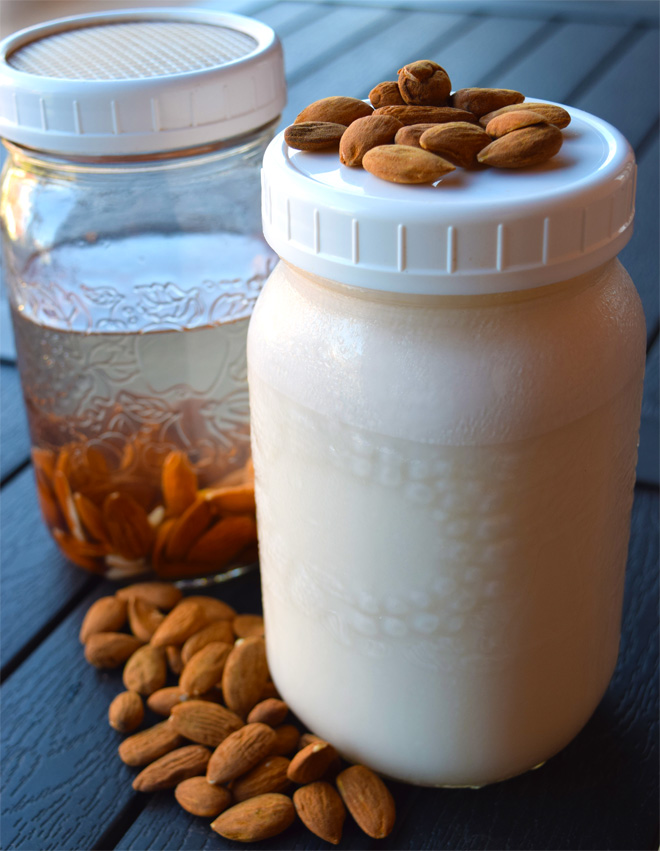
Other than toxic synthetic vitamins, your typical carton of store-bought “almond milk” also contains additives, preservatives, too much sodium and sugar. Even if you purchase what claims to be an unsweetened and organic product it will still contain harmful chemicals, and provide you with none of the benefits of whole almonds. Simply put, there is no healthy choice for almond milk that exists on supermarket shelves today.
It can be especially frustrating if you made the wise decision to cut out cow’s milk only to find out that the store-bought almond milk you replaced it with is so unhealthy. However, there is no need to be discouraged because from this point on you will be consuming a delicious, natural and homemade beverage that helps to build and maintain a healthy body.
Discover How to Make Almond Milk at Home.
Marc Jaoudé
Naturopath, Health Educator
Nutrition & Exercise Specialist
REFERENCES:
- Penniston K, Tanumihardjo S. The Acute and Chronic Toxic Effects of Vitamin A. Am J Clin Nutri. 2006 Feb;83(2): 191-201).
- Heikkinen AM, Tuppurainen MT, Niskanen L, Komulainen M, Penttil I, Saarikoski S. Long-term vitamin D3 supplementation may have adverse effects on serum lipids during postmenopausal hormone replacement therapy. Eur J Endocrinol. 1997 Nov;137(5):495-502.
- Tuppurainen M, Heikkinen AM, Penttil I, Saarikoski S. Does vitamin D3 have negative effects on serum levels of lipids? A follow-up study with a sequential combination of estradiol valerate and cyproterone acetate and/or vitamin D3. Maturitas. 1995 Jun;22(1):55-61.
- Witham MD. Vitamin D deficiency: More evidence is needed before general supplementation. BMJ. 2008 Jun 28;336(7659):1451
- Tuohimaa P, Tenkanen L, Ahonen M, Lumme S, Jellum E, Hallmans G, Stattin P, Harvei S, Hakulinen T, Luostarinen T, Dillner. Both high and low levels of blood vitamin D are associated with a higher prostate cancer risk: a longitudinal, nested case-control study in the Nordic countries. Int J Cancer. 2004 Jan 1;108(1):104-8.
- Marshall TG. Vitamin D discovery outpaces FDA decision making. Bioessays. 2008 Feb;30(2):173-82.
- Meyer G, Kpke S. Vitamin D and falls. Information on harm is missing. BMJ. 2009 Oct 28;339:b4395. doi: 10.1136/bmj.b4395.
- Bajnok L. [Vitamin D and calcium in the mirror of clinical evidence]. Orv Hetil. 2016 Jul;157(31):1242-7. doi: 10.1556/650.2016.30419.
- Clement, Brian (2009). Supplements Exposed: The Truth They Don’t Want You to Know About Vitamins, Minerals, and Their Effects on Your Health. Franklin Lakes. New Page Books.
- Mark J. Bolland, Andrew Grey, Ian R. Reid. Calcium supplements and cardiovascular risk: 5 years on. Ther Adv Drug Saf. 2013 Oct; 4(5): 199–210.
doi: 10.1177/2042098613499790 - H A Bischoff-Ferrari, B Dawson-Hughes, J A Baron, P Burckhardt, R Li, D Spiegelman, B Specker, J E Orav, J B Wong, H B Staehelin, E O’Reilly, D P Kiel, W C Willett. Calcium intake and hip fracture risk in men and women: a meta-analysis of prospective cohort studies and randomized controlled trials. Am J Clin Nutr. 2007 Dec;86(6):1780-90.
- Skerrett P. Selenium, Vitamin E Supplements Increase Prostate Cancer Risk. Harvard Health Publications. Available at: http://www.health.harvard.edu/blog/selenium-vitamin-e-supplements-increase-decrease-prostate-cancer-risk-201402287059. Last accessed: February 28, 2014.
- Lelah, Michael. Conference paper presented at the American Oil Chemists’ Society (AOCS) Hot Topics Symposium, May 2006. Theme: Controversy over the Role of Natural Vitamin E in Reducing Leading Causes of Death.
- Rosenbloom M. Vitamin Toxicity. Medscape. Available at: http://emedicine.medscape.com/article/819426. Last accessed: Octobor 14, 2014.
UPDATE: 2014- October 16th
I was alerted of a social media attack that Dr. Joe Schwarcz launched against me on October 4th. Dr. Joe Schwarcz is a Montreal chemist and media personality who teaches the public that synthetic nutrients are equivalent to their natural counterparts and, on numerous other topics, he has consistently supported big industry (chemical companies) versus defending public interest.
Dr. Joe Schwarcz posted my article on almond milk on his Facebook page and wrote “The Food Babe is not the only nutritional numbskull out there. This character is bloated with ignorance”.
Here was my response:
I am the author of the article on almond milk. I stand by my article 100%…
I haven’t read any facts to counter the points made in my article. We have made unbelievable advances in science and medicine, and this has served humanity very well. However, I hope we have not come to a point of arrogance that we believe that synthetic man-made nutrients are equal to what nature offers us?
Someone commented that a glass of commercial almond milk is normally around 30 calories. This is equivalent to about 5g of almonds or 3-5 almonds. 5g of almonds contain 1.3mg of vitamin E, yet many almond milks sold on the market contain 10 mg of vitamin E. 5g of almonds contain 0.1 IU of vitamin A, yet almond milk labels claim 500 IU for those same 30 calories. The point being that you are consuming some sort of multivitamin every time you down a glass of almond milk. Some people are okay with that, however, a majority of people are largely unaware. I do not believe that people would blindly walk into a pharmacy, pick up any supplement without reading the label, and start taking it daily. However, when it comes to foods, especially those labelled with natural ingredients, the public doesn’t generally make the connection that they are consuming the equivalent to supplement pills. What’s even more fascinating is the fact that, under current laws, a vitamin marketed as “natural” only needs to contain 10% of real, plant-derived natural ingredients, while the other 90% can be synthetic. Again, some people are okay with that, especially Dr. Joe Schwarcz who, as a chemist, doesn’t see the difference. However, whatever your position is on synthetics versus natural, wouldn’t you agree that false labelling is an issue?
Finally, people that enjoy keeping up to date with scientific research will take this opportunity to cite the many studies that clearly show that we do better when we consume nutrients that come as part of their whole matrix, and this includes literally thousands of cofactors all working together in synergy. I always tell my clients that we should listen to the scientists, and I strive to educate them to become better consumers of scientific research. I could go on citing the numerous studies that I reviewed before writing my article but, to be brief, I will end with one quote from Professor Isobel Jennings from Cambridge University who wrote in her book, Vitamins in Endocrine Metabolism, “Synthetic vitamins, prepared from chemicals instead of nature, are frequently less active biologically than their natural counterparts, thereby reducing any beneficial effect they may have.” Yes, I stand by my simple point that almonds are better than synthetic nutrients produced by scientists in a lab- and if that makes me a “numbskull” then so be it.
Marc Jaoude

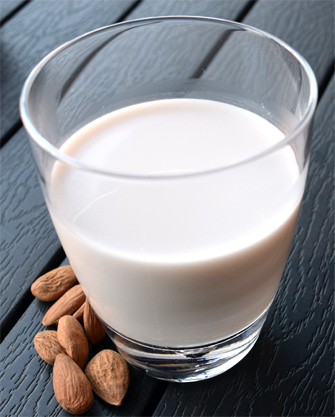
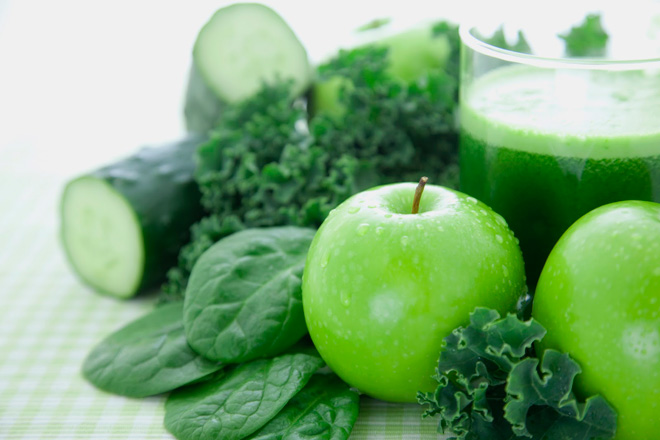
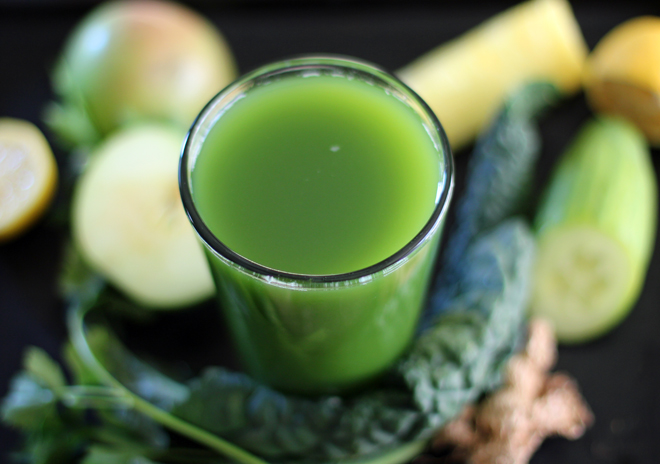
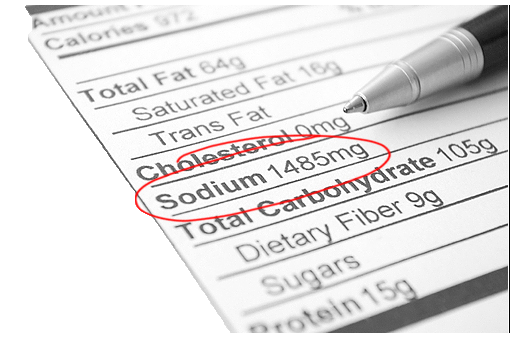
Simply Almond Unsweetened was the only store bought almond milk I would use. However, I recently started making my own and I will no longer be purchasing almond milk ever again.
That’s great Joe. In addition to being much more nutritious, homemade almond milk also tastes a lot better! Here’s my article on how we make our own nut milk- I’m sure it’s very similar to what you are already doing: https://markitonutrition.com/how-to-make-almond-milk-at-home/
Hi, do you know if Oat milk is okay to drink? Thank you
Hi Ashley,
we actually just produced a test batch of sprouted oat milk, it was pretty good. But again, we are talking about using whole natural ingredients plus pure distilled water, nothing more. I can’t comment generally on what is on the market, it would have to depend on the brand. You can send me something privately to look at if you like.
When it comes to plant milks I really feel that the best option is to make them yourself at home, and you can use the ones you find at the store as a backup when needed. It’s not time consuming and you get to benefit from real food minus unnecessary ingredients.
HI !
I try to eat as much organic raw as possible, but this upcoming scare about a lack of food on the shelves caused me to look at boxes of cereals and coconut/almond drinks. Then I noticed the chemicals. Also finding no salt and no sugar in products is difficult, but I have had no chance to build my own organic garden that would be enclosed with an excellent air filter.
I found potassium citrate and sodium citrate in coconut milk creamer with little salt and sugar. These are said to be not chemicals so why label them that way?
What foods could I possibly find on the shelves that are shelf stable and at the same time having the least chemicals/sugar/salt until inflation stabilizes again? So many videos say we may see hyperinflation and a world like the holocaust or the 1929 stock market crash/steal and long depression after that.
The word organic I don’t think is used enough. I have watched many videos on those gmos that say these gmos are wrecking our bodies just like the bugs that eat the corn and soy, etc. Have you seen the video GENETIC ROULETTE? Plus I could only find one almond brand nut that is not pasteurized. So I bought it. Since pasteurization kills nutrition, this sounds like eating anything pasteurized is a total waste of money.
I watched a video about tower gardens where one person said that even the organic crops are sprayed with glyphosate. I might as well give up. I have been reading about the depopulation agenda a long time. Glyphosate and radiation and aluminum are always blowing in the wind and flowing in the water. That doesn’t even include all those plastic and fracking chemicals. We are said to have around 95% BPA/plastic chemicals in our blood in people all over the world.
I understand the frustration and anxiety that comes once we learn more about environmental pollutants, and how they affect human health. As I mention in my video “How to Remove Dioxins from Your Body”, the number 1 source of pollution entering our body is through consumption of animal flesh and secretions. Furthermore, there are foods we can eat that can help shield us from these toxins. As far as water goes, the safest and cleanest water is distilled water. We are proud to have provided our clients with the best distillers for over a decade, and for the fact that they can now rest assured that they are consuming clean water. As far as shelf stable foods, dry beans and grains would be my answer. Especially if raw and organic, you would be able to sprout them in the future for an abundance of nutrition.
Seeing so many scientific opinions, I don’t even know who’s right anymore…
Like take this website for example, they claim that calcium carbonate is a naturally occurring compound and that carrageenan being harmful is a myth (the exact opposite of your articles) :
http://www.safebee.com/food/food-additives-are-they-safe-or-can-they-make-us-sick
http://www.safebee.com/food/truth-about-carrageenan
I understand the frustration with conflicting information, so much so that I give a lecture on how to become a better consumer of information- ultimately I want people to feel confident in their own ability to understand the available evidence. The answer lies in knowing how to read scientific studies just enough to be able to determine if there is a convergence of evidence on the topic in question. For example, when discussing calcium supplements I referenced some studies that are worth reading. The convergence of scientific evidence shows that calcium supplementation can do more harm than good, and this mineral is best obtained from whole foods. The internet is full of opinions, but what matters in the end is the evidence behind those opinions.
I agree we don’t know what to believe now. Could that mean we shall all go back to the Basics?
I mean the basics being natural, unadulterated foods, yes, whole foods, and avoiding “natural flavors” which are not natural. Hoping you already know about Excitotoxins, the Taste That Kills, in Russell Blaylock’s book.
Absolutely Kathy, a return to real, whole foods is the path to better health, helping us avoid the many chronic diseases that affect a majority of the population.
Thanks for your enlightening research, I am a big consumer of Almond milk. I used to make my own milk years ago, but I got excited when I could find it already made in the supermarket. Now I will go back to making it fresh. Nowadays We find ourselves at the mercy of such deceitful business people that can’t be trusted. Thank God for your willingness to save us from dreadful diseases that are the result of the food we are purchasing through ignorance.
Thank you for your comments Nana. Yes, nothing compares to fresh homemade almond milk. Not only is it healthier for us, but it also tastes a whole lot better than the alternatives typically sold in grocery stores. Glad you are going back to making it yourself.
If you buy almonds, they are more than likely not organic, there are chemicals in the ground everywhere. This is ridiculous, it would cost so much to make your own. You can make all that organic stuff, and still be sick. God is the only one who knows your beginning and end. I see so many sick looking people that shop at Health stores. They don’t look any better than a person eating organic. I use to do the organic thing. I now realize it was a waste of money.
I agree that you can find many sick people shopping at health stores. One reason is because the large majority of products sold at these stores are not healthy! You can find organic potato chips, organic alcohol, and organic gummy bears! However, for people who wish to take control of their health and longevity, proper food and exercise can prevent, stop and reverse chronic disease. We should not brush that aside but instead look to educate ourselves further.
I heard rumors that some milk contains aspartame and have been researching and found your site. Thanks for the information you provide.
Thank you for visiting Pete, and welcome to our community.
I don’t think the main blame is S. A. D. standard American diet it should be those in power F. D. A. food drug administration our government that’s knowingly and allowing actual poisons to be put in the American people’s food on purpose. There is also cyanide poison in almond milk. That’s right. Discovers by Dr.
ebi the only doctor that’s on record that’s has cured
Diabetes, blindness,hiv, cancer, herpes, and other diseases. No other doctors nor does western medicine cure anything. ( doctors have not even cured the common cold yet . !!!
Please do not mislead people to believe viruses and physical abnormalities can be “cured” …the body bypasses abnormalities where it can and viruses go dormant…they are opportunistic…good health only keeps them at bay….smh….HIV, herpes etc are viruses…. these ignorant statements are why disease is spread…. people think they are “cured”
Dr. SEBI
Also Dr. Sebi won his court case against the state of New York for his claims of curing those diseases Not Suppressing them. His work is well documented please research. Also curing the body through food and herbs is Not the reason these diseases have spread. Please get more information about this before speaking on it.
Thank you for this wonderful information. I make my own almond milk but get my almonds from Trader Joes. Can you please provide with a link to where I can order it from the European store? Thank you!
Thank you Nancy. Your best bet for European almonds is to find a local health store that carries them. This way you can save on shipping costs. You could find an online store, but I can’t recommend one because it’s best to order from somewhere that is close to where you live. Happy 4th of July!
A child who was breast fed and also lactose intolerant drinks a cup or so of Silk Chocolate or regular almond milk a day. He never appeared to have any negative reactions but now he’s getting increased bowel movements with pain and diarrhea. Could this be attributed to his intake of Almond Milk. and possibly the artificial additives and vitamins they add. He’s only 2 and his mother is very careful about everything he eats but may not know there are issues with Almond Milk. Please share your perspective.
Hello Joanne,
You would have to look at the child’s nutrition as a whole. Unfortunately, many products are fortified/enriched with synthetic supplements and toxicity is possible, especially for children under the age of 8. You just have to remind mothers that even when a package advertises a whole food (such as almonds) many times what they are buying is a mixture of some of the cheapest synthetic vitamins available on the market. You can start by eliminating all processed foods and supplements, and then begin a process of elimination with the foods he consumes.
Hi, Dr. Mark. I am very aware of the danger of bad nutrition and want to do something about that. I’ ve read your article about almond milk and I would like to ask you this question. What other alternative does some one who lives in the U.S. Have to access to real almond milk since you only deliver to local residents in your country? Thank you
Hello Milo,
the solution is to make the almond milk yourself at home. I sent you all the information you need via email.
As I am sitting here drinking my homemade almond milk, warmed with cinnamon and a rooibos chai teabag, I decided to find out if heating my milk was a bad thing and found your website. I use Trader Joe’s Raw Almonds and just recently found out about the stupid USA requirement of pasteurizing almonds, but thought the steam process was ok, which is what TJ’s uses. If that’s not ok, then can you give us the source of your European almonds? I would be interested in getting some myself. And also, is heating the almond milk destroying the nutrients? I heated gently on the stove, not the microwave. Thanks!
Hi Jane,
Glad you are enjoying your homemade almond milk, we do very similar recipes as well. Steaming almonds does effect their nutrient level as well as create potentially harmful chemicals that we would prefer to avoid. Unless you are buying very large quantities of organic European Almonds, your best bet is to find a local health store that sells them. This way you won’t have to pay a high price in shipping. And if you can’t find a store near you, then you would look at online options. We are in Montreal, Canada, so shipping to you would cost more in shipping than the actual almonds!
Gently warming up the milk as you are doing is fine, just let it get warm to the touch but not too hot. As far as heating goes in general, when we prepare raw snacks for our clients, we dehydrate/heat at a temperature lower than 118 F (48 C). This is not something that you have to get overly concerned about with every single item you consume, just as long as a large portion of your daily nutrition features fresh living foods. Of course, I’m more strict when it comes to clients suffering from health issues.
All the best.
Thank you for your reply, I live in Montreal too and I can’t find almond milk with natural calcium. So I’m starting to make my own almond milk and it was very hard to find information about how much calcium we get from almond milk and how much it was lost in the pulp.
So with a natural diet I guess it’s safe to say that we need around 500 mg of natural calcium per day.
You are welcome. Yes, I would say that an average person consuming a proper plant-based diet would do just fine with just over 500mg of calcium. However, as previously stated, these numbers do not mean as much as some would have you believe. In all, calcium intake is not high on my list of concerns. The main focus remains on helping clients transition to a healthier diet which, incidentally, naturally contains an abundance of nutrients in what we now understand to be ideal ratios. The moment we begin to pull away from such a diet we begin to notice imbalances and deficiencies.
And, just to be clear, supplementation in today’s enviroment is important- especially as our soil is becoming depleted, our stress levels are elevated, and our diets are less than ideal- but the supplements that should be recommended are those that are composed of 100% whole foods, and not isolated, synthetic nutrients.
How much calcium do you get from a cup of a homemade almond milk? Usually in comercial almond milks you get 30% of artificial calcium or calcium carbonate.
The amount of calcium in homemade almond milk depends on the almond to water ratio. We use just over a cup of whole almonds to produce 32 ounces of almond milk, and so a cup of our homemade almond milk contains approximately 100mg of calcium.
The Recommended Daily Intake for calcium is 1000mg, and so 100mg would be 10%. However, we should not take the RDIs of nutrients too seriously. RDIs are based on isolated or synthetic chemicals and not on naturally occurring nutrients from whole foods. Naturally occurring nutrients are better digested, absorbed and utilized by the human body. So if you supposedly need some gigantic amount of an isolated or synthetic nutrient, you are more than likely to require a smaller amount of this same nutrient if you are getting it from whole food in it’s complete form. Furthermore, the amount of a nutrient we can absorb depends on a variety of factors, one of which is the complexity of nutrient interactions. For example, there are many nutrients that either help or block the absorption of calcium- some of which we may not even know about yet. Another factor is that the body, at any given time, will absorb a different amount of a nutrient depending on what its needs are at that particular moment. It is therefore very safe to conclude that what our overall diet looks like is of much greater importance than the exaggerated focus that we place on individual nutrients.
In short, there are many variables to determine what the ideal amount of each nutrient is for every person, and everything we know today tells us that relying strictly on RDIs is a very foolish paradigm, one that negates facts about overall health, good nutrition, and the complexity of how the human body functions. Discussing nutrition with a calculator to see if we meet RDIs is a reductionist approach, and while it has helped to boost the sale of synthetic supplements, it has done very little to improve our overall health. In fact, more and more research is showing the foolishness and dangers of consuming mega doses of isolated nutrients, all in hopes of meeting the RDIs. This is why I tell my clients, for the most part, to ignore the RDIs as they are transitioning to a healthier overall diet and lifestyle. And when I do talk about individual nutrients, such as calcium, I do my best to paint a more complete picture.
For more info regarding calcium I recommended that you watch my video entitled “The End of Osteoporosis”, and also read my Q&A article entitled “Bone Loss Begins at 30- you CAN prevent it”. All the best.
Hello,
I wanted to ask a question about Almonds, and the statement:
“Propylene oxide is a toxic carcinogen that has been banned for use on food products in Canada, Mexico, and the European Union.”
How is it that you can buy food products (i.e. Almonds at Costco in Canada) that have this chemical on them if it has been banned?
Thanks,
Rob
Hello Rob,
The short answer is that not all almonds are pasteurized with propylene oxide.
In 2007 the FDA did make it mandatory to pasteurize all almonds in the US, Mexico and Canada, however, the almonds can be pasteurized through several methods, one of which is harmful propylene oxide fumigation. To be certified organic, propylene oxide fumigation is not allowed, and therefore other means of pateurization are used (high heat). And even though the almonds are pasteurized, they are still sold under the pretence that they are raw. This is why the only almonds we buy are truly raw, organic almonds from Europe.
Hope this answers your question. It should not have to be so tricky for consumers to know what they are purchasing, and hopefully we will one day see stronger labelling regulations enforced to protect the consumer.